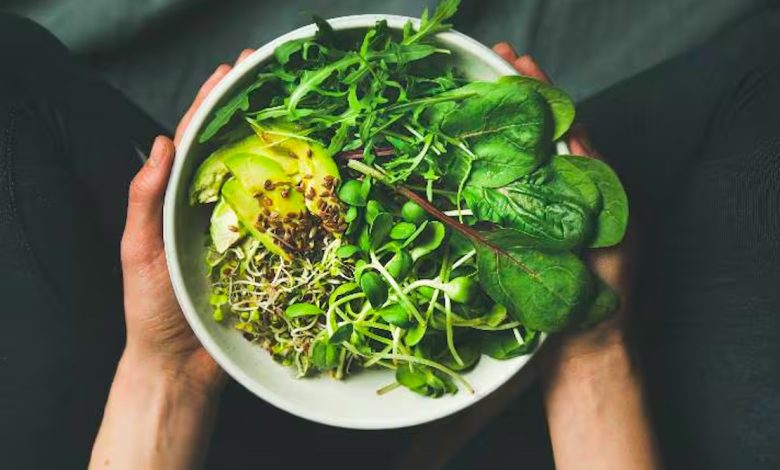What happens to your body when you switch to a vegan diet?

Vegan diet: Globally, the number of people trying a vegan diet is slowly but steadily growing due to health, ethical and environmental concerns. This special diet involves eliminating all animal products, including meat, dairy, eggs, and honey, and focusing on plant-based foods such as fruits, vegetables, grains, legumes, nuts, and seeds. But making the shift to a vegan diet is more than just a change in what’s on your plate! It can also significantly impact your physical health, mental well-being, and even the environment. Understanding the effects of a vegan diet on your body is crucial.
Switching to a vegan diet can lead to numerous benefits for your body, mind, and the planet. While there may be some initial adjustments and potential nutritional deficiencies to consider, the long-term health benefits can be significant. Let’s explore what happens to your body when you adopt a vegan lifestyle. By planning your meals thoughtfully and educating yourself about your nutritional needs, you can successfully navigate this transition and thrive on a vegan diet.
What happens to your body after you go vegan?
When switching to a vegan diet, there are several changes that your body may experience. Digestive changes are one of the first things you will notice is a change in your digestion. A vegan diet tends to be higher in fibre due to the increased intake of fruits, vegetables, whole grains, legumes, nuts, and seeds, according to the journal Frontiers in Nutrition. While fibre is essential for healthy digestion, the sudden increase can lead to temporary bloating and gas as your digestive system adjusts.
Tips for a smooth transition:
Gradually increase your fibre intake.
Stay hydrated.
Incorporate probiotic-rich foods like sauerkraut or yoghurt (if you’re not strictly vegan) to support gut health.
What are the nutritional benefits of vegan diet?
Switching to a vegan diet can provide many health benefits, given the right choices:
May improve heart health:
A vegan diet is often associated with lower cholesterol levels and blood pressure. The abundance of fruits, vegetables, whole grains, and healthy fats (such as those from avocados and nuts) contributes to heart health, according to Endotext.
May support weight management:
Many people find that adopting a vegan diet helps them lose or manage weight more effectively. They are typically lower in calories and saturated fats, making it easier to maintain a healthy weight, as per the Obesity Medicine Association.
May lead to increased energy levels:
Vegan diet, A well-rounded vegan diet rich in whole foods can lead to improved energy levels. Many individuals report feeling more energised and alert after transitioning, likely due to the higher intake of vitamins, minerals, and antioxidants, as per the journal Nutrients.
Are there any side effects of vegan diet?
While a vegan diet has many benefits, it is crucial to be aware that following this diet may lead to certain nutritional deficiencies.

Vitamin B12:
Vitamin B12 is primarily found in animal products, so vegans need to be mindful of this vitamin. A deficiency can lead to anaemia and neurological issues. Consider fortified foods or a B12 supplement to ensure you meet your dietary needs, as recommended by the Office of Dietary Supplements (ODS).
Iron:
Plant-based iron (non-heme iron) is not absorbed as well as heme iron from animal sources. Including vitamin C-rich foods can help enhance iron absorption. Foods such as spinach, lentils, and fortified grains are excellent vegan sources of iron.
Omega-3 Fatty Acids:
Vegan diet, These essential fats are vital for brain health and are primarily found in fish, as per the journal Advances in Nutrition. Vegans can obtain omega-3s from sources such as flaxseeds, chia seeds, and walnuts, or consider an algae-based supplement.
Mental and emotional changes when switching to a vegan diet
Mental and emotional changes can refer to various shifts in a person’s psychological state or emotional well-being:
Mood improvement:
Research published in the British Medical Journal suggests that a diet rich in fruits, vegetables, and whole foods can support mental health. The increase in antioxidant-rich foods may help reduce symptoms of anxiety and depression.
Ethical satisfaction:
Many people find a sense of satisfaction and fulfilment in eating vegan due to their moral beliefs regarding animal welfare and environmental sustainability. This emotional boost can contribute positively to overall well-being.
Long-term health effects of a vegan diet
Switching to a vegan diet can lead to several long-term health effects:
Reduced risk of chronic diseases:
Several studies published in the Journal of Geriatric Cardiology have shown that vegans may have a lower risk of chronic diseases, such as heart disease, type 2 diabetes, and certain cancers. This is often attributed to the increased intake of fibre and nutrients, as well as the reduced consumption of harmful saturated fats.
Longevity:
Vegan diet, Although further research is needed, some studies suggest that individuals following a plant-based diet may have a lower risk of premature death compared to those who consume meat. The antioxidants in plant foods, along with a host of other nutrients, may contribute to this increased longevity, according to the journal Foods.
Increased food awareness:
Adopting this diet often leads to heightened awareness of food choices and the ingredients in products. This consciousness can foster healthier eating habits and inspire more home cooking, according to The Nutrition Source.
Ultimately, everybody is different, and it is essential to listen to your own needs throughout this transition. With a bit of patience and research, transitioning to this diet can be a rewarding and enriching experience.
Also Read:
The Best Skin Care Routine For 40s
Oxygen Facial Benefits: The 9 Amazing Benefits Of Oxygen Facial For Glowing Skin
Glowing Skin Routine: The 7 Days Glowing Skin Challenge
11 high-fibre foods to relieve constipation and promote digestive health




